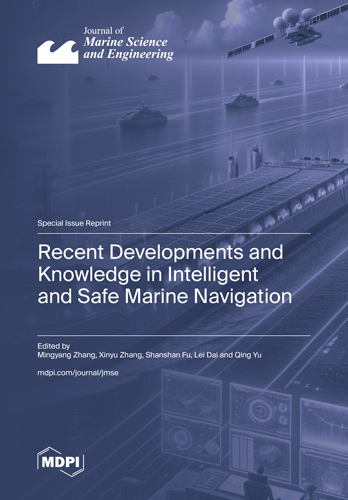Recent Developments and Knowledge in Intelligent and Safe Marine Navigation/–ü–ĺ—Ā–Ľ–Ķ–ī–Ĺ–ł–Ķ —Ä–į–∑—Ä–į–Ī–ĺ—ā–ļ–ł –ł –∑–Ĺ–į–Ĺ–ł—Ź –≤ –ĺ–Ī–Ľ–į—Ā—ā–ł –ł–Ĺ—ā–Ķ–Ľ–Ľ–Ķ–ļ—ā—É–į–Ľ—Ć–Ĺ–ĺ–Ļ –ł –Ī–Ķ–∑–ĺ–Ņ–į—Ā–Ĺ–ĺ–Ļ –ľ–ĺ—Ä—Ā–ļ–ĺ–Ļ –Ĺ–į–≤–ł–≥–į—Ü–ł–ł
–ė–∑–ī–į–Ĺ–ł–Ķ –Ĺ–į –į–Ĺ–≥–Ľ–ł–Ļ—Ā–ļ–ĺ–ľ —Ź–∑—č–ļ–Ķ
The book is devoted to modern technologies in maritime navigation and their impact on international trade and the global economy. It examines how artificial intelligence, machine learning and big data analysis are transforming navigation approaches, making them safer and more efficient. The author describes how these technologies help optimize ship routes, reducing fuel consumption and minimizing the environmental footprint.
The book also discusses the prospects for autonomous vessels and the role of the Internet of Things in real-world monitoring of the condition of ships and their components. The importance of cybersecurity is mentioned in light of the increasing dependence on digital technologies. Overall, the book highlights that the fusion of technology and traditional practices in the maritime industry opens up new opportunities for safer and more sustainable navigation, which in turn affects global trade and the environment.
Contents
About the Editors
Preface
Mingyang Zhang, Xinyu Zhang, Shanshan Fu, Lei Dai and Qing Yu
Recent Developments and Knowledge in Intelligent and Safe Marine Navigation
Reprinted from: J. Mar. Sci. Eng. 2023,11, 2303, doi:10.3390/jmse11122303
Hui Wan, Shanshan Fu, Mingyang Zhang and Yingjie Xiao
A Semantic Network Method for the Identification of Ship’s Illegal Behaviors Using Knowledge Graphs: A Case Study on Fake Ship License Plates
Reprinted from: J. Mar. Sci. Eng. 2023,11,1906, doi:10.3390/jmse11101906
Zheng Chang, Xuzhuo He, Hanwen Fan, Wei Guan and Linsheng He
Leverage Bayesian Network and Fault Tree Method on Risk Assessment of LNG Maritime Transport Shipping Routes: Application to the China-Australia Route
Reprinted from: J. Mar. Sci. Eng. 2023,11,1722, doi:10.3390/jmse11091722
Zishuo Huang, Qinyou Hu, Lan Lu, Qiang Mei and Chun Yang
Online Estimation of Ship Dimensions by Combining Images with AIS Reports
Reprinted from: J. Mar. Sci. Eng. 2023,11,1700, doi:10.3390/jmse11091700
Shiguan Liao, Jinxian Weng, Zhaomin Zhang, Zhuang Li and Fang Li
Probabilistic Modeling of Maritime Accident Scenarios Leveraging Bayesian Network Techniques
Reprinted from: J. Mar. Sci. Eng. 2023,11,1513, doi:10.3390/jmse11081513
Haibin Li, Xin Wang, Tianhao Wu and Shengke Ni
A COLREGs-Compliant Ship Collision Avoidance Decision-Making Support Scheme Based on Improved APF and NMPC
Reprinted from: J. Mar. Sci. Eng. 2023,11,1408, doi:10.3390/jmse11071408
Xintong Liu, Yutian Hu, Huiting Ji, Mingyang Zhang and Qing Yu
A Deep Learning Method for Ship Detection and Traffic Monitoring in an Offshore Wind Farm Area
Reprinted from: J. Mar. Sci. Eng. 2023,11,1259, doi:10.3390/jmse11071259
Yuankui Li, Jinlong Cui, Xinyu Zhang and Xuefeng Yang
A Ship Route Planning Method under the Sailing Time Constraint
Reprinted from: J. Mar. Sci. Eng. 2023,11,1242, doi:10.3390/jmse11061242
Jiafen Lan, Mao Zheng, Xiumin Chu and Shigan Ding
Parameter Prediction of the Non-Linear Nomoto Model for Different Ship Loading Conditions Using Support Vector Regression
Reprinted from: J. Mar. Sci. Eng. 2023,11, 903, doi:10.3390/jmse11050903
Zhe Sun, Yunsheng Fan and Guofeng Wang
An Intelligent Algorithm for USVs Collision Avoidance Based on Deep Reinforcement Learning Approach with Navigation Characteristics
Reprinted from: J. Mar. Sci. Eng. 2023,11, 812, doi:10.3390/jmse11040812
Yaping Zhu, Qing Zhang, Yang Liu, Yancai Hu and Sihang Zhang
Neural Network, Nonlinear-Fitting, Sliding Mode, Event-Triggered Control under Abnormal Input for Port Artificial Intelligence Transportation Robots
Reprinted from: J. Mar. Sci. Eng. 2023,11, 659, doi:10.3390/jmse11030659




